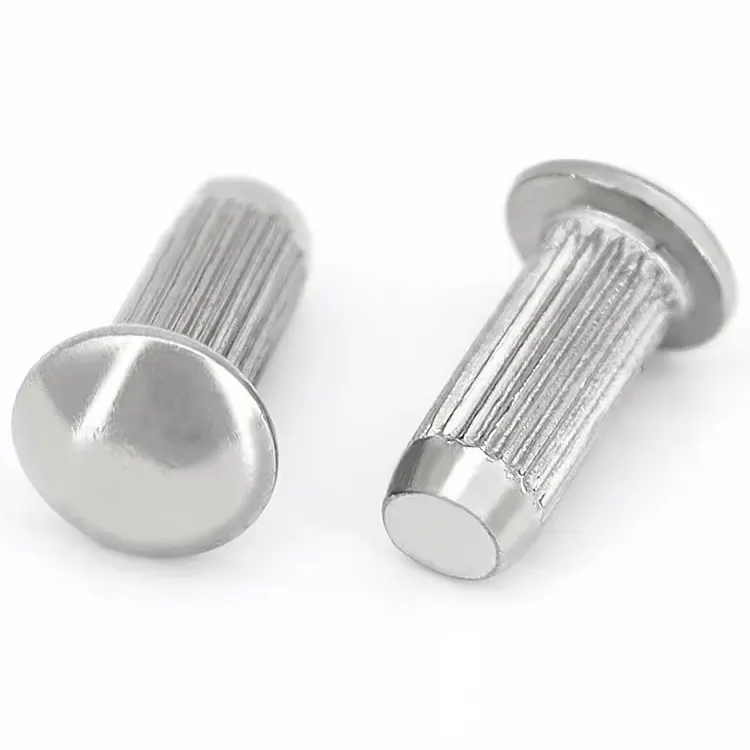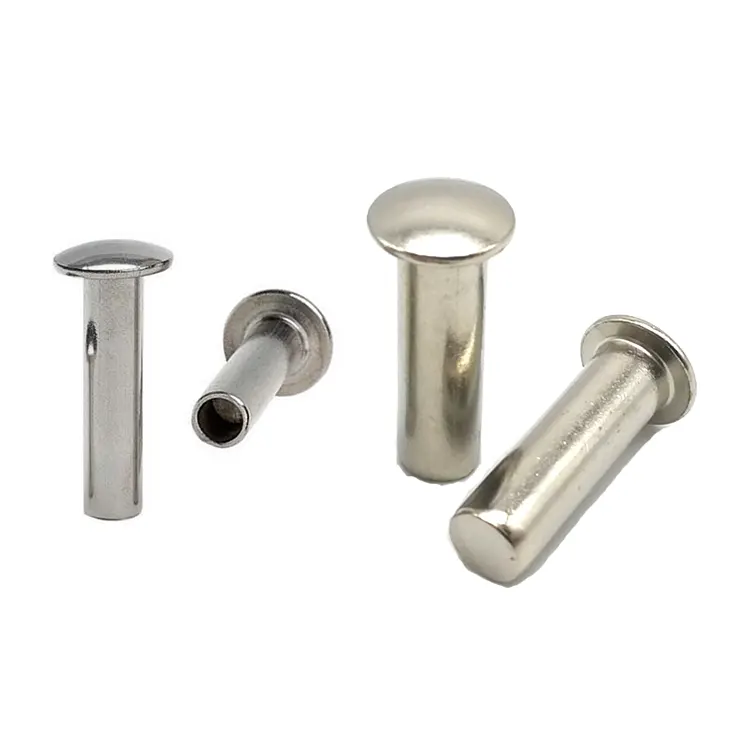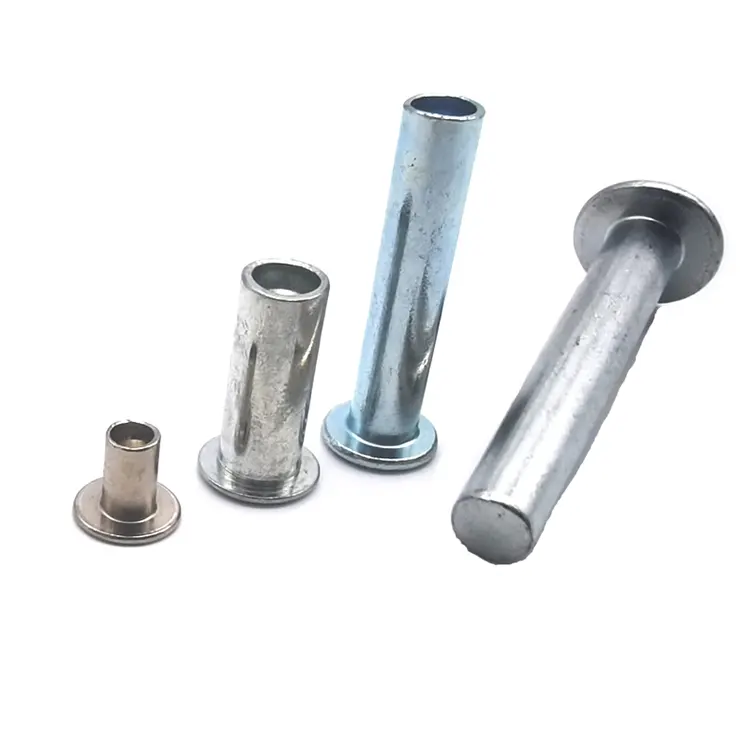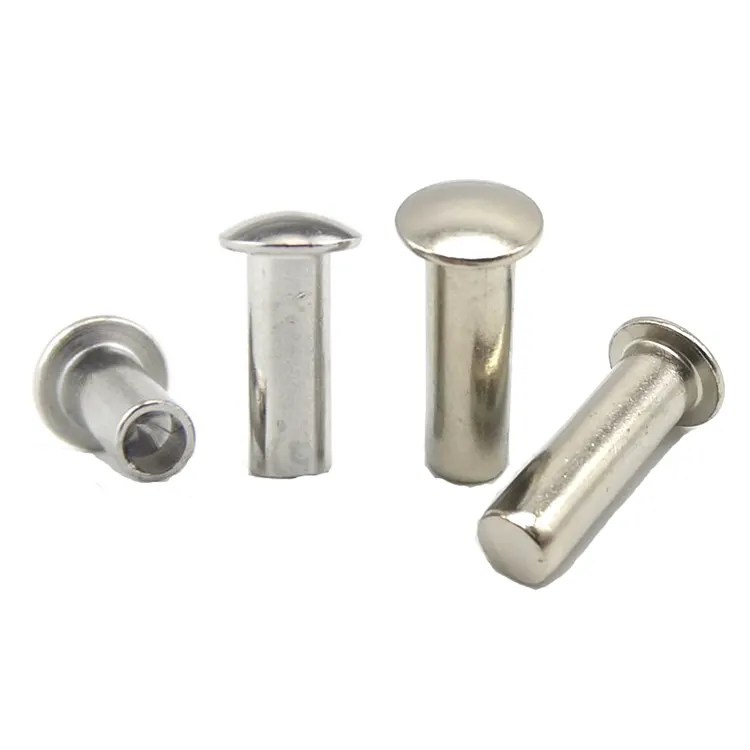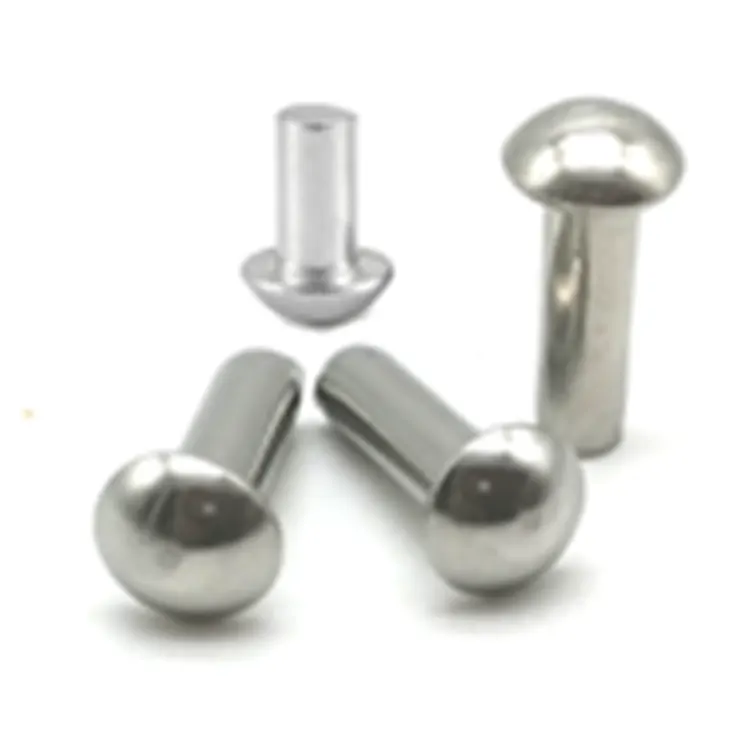Nieten
As one of professional manufacturer in China, Notin would like to provide you Rivets. And we will offer you the best after-sale service and timely delivery.
What is a rivet?
A rivet is a permanent mechanical fastener used to join two or more materials. Rivets work by inserting a metal pin into an aligned hole and deforming the end, creating a strong, secure, and durable connection. Unlike temporary fasteners like screws, rivets do not rely on threads, but instead form a permanent connection, making them ideal for applications requiring high strength, durability, and vibration resistance.
Classification of Rivets
Rivets are typically categorized by head shape, degree of hollowness, or material.
Based on head shape, rivets can be classified as flat head rivets, round head rivets, countersunk head rivets, mushroom head rivets, universal head rivets, truss head rivets, etc.

Based on degree of hollowness, rivets can be classified as solid rivets, semi-tubular rivets, or full tubular rivets.
Based on material, rivets can be classified as brass rivets, stainless steel rivets, steel rivets, aluminum rivets, copper rivets, etc.

What surface finishes are available for rivets?
Rivet surfaces are typically treated with rust-proofing treatments, primarily electroplating, including zinc plating, nickel plating, chrome plating, tin plating, gold plating, and silver plating. Electroplating is a common rust-proofing method for rivets. It applies a layer of plating to the rivet surface through physical or chemical methods. The plating effectively prevents corrosion and rust, while also providing a certain aesthetic effect.
Another special surface treatment method is head coating. Head coating is performed after the rivet is electroplated. This allows for a variety of colors on the rivet head, achieving an aesthetically pleasing finish.
Aluminum rivets cannot be electroplated, but they can be anodized. Anodizing also allows for a variety of color options, but the unit price is higher than electroplating.
Rust-proofing the rivet surface is crucial, effectively extending the rivet's service life and ensuring a secure connection. Different rust-proofing methods are suitable for different environments and applications, so the choice should be tailored to the specific situation.
- View as
Männlich-weibliche Nieten
Nuote Metals ist ein spezialisierter Hersteller von Außennieten in China. Die Vorteile von Außennieten sind die einfache Installation und die niedrigen Kosten. Im Vergleich zu anderen Verbindungsmethoden wie Schweißen oder Kleben erfordern männlich-weibliche Nieten keine besonderen Fähigkeiten oder lange Aushärtezeiten. Allerdings sind auch ihre Nachteile erheblich: Die Verbindungsstärke ist begrenzt und daher für Umgebungen mit hoher Intensität oder starken Vibrationen ungeeignet. Nach längerem Gebrauch können sie sich lösen und müssen regelmäßig überprüft werden.
WeiterlesenAnfrage absendenGerändelte Nieten
Rändelnieten bestehen typischerweise aus Kopf, Schaft und Schwanz. Der Schaft verfügt über ein diagonales oder gerades Rändelmuster, eine bearbeitete, geprägte Textur, die für einen besseren Halt während der Installation sorgt und ein Abrutschen des Werkzeugs verhindert. Der Schaft ist zylindrisch, wobei Länge und Durchmesser je nach Anwendung variieren. Übliche Größen reichen von 3 mm bis 8 mm Durchmesser und 5 mm bis 20 mm Länge. Das Endstück kann auch Gewinde oder Nuten zur Aufnahme von Muttern oder anderen Befestigungselementen aufweisen.
WeiterlesenAnfrage absendenRundkopfnieten aus Eisen
Rundkopfnieten aus Eisen sind ein Befestigungselement, das in der industriellen Fertigung und im Alltag weit verbreitet ist. Ihr einzigartiges Design und ihre hervorragende Leistung machen sie in vielen Bereichen zur ersten Wahl. Nuote Metals ist auf die Herstellung von Rundkopfnieten aus Eisen spezialisiert. Die Abmessungen unserer Nieten halten sich strikt an die in den Zeichnungen des Kunden angegebenen Toleranzen. Jeder Prozess unterliegt einem Qualitätskontrollzyklus, um die Qualität des Endprodukts sicherzustellen. Wir verfügen über Dutzende Kaltstauchmaschinen mit einer täglichen Produktion von mehreren zehn Millionen Nieten.
WeiterlesenAnfrage absendenEisennieten
Eisennieten, auch bekannt alsNieten aus Kohlenstoffstahlsind Befestigungselemente, die üblicherweise aus Kohlenstoffstahl mit Oberflächenbehandlungen wie Verzinkung hergestellt werden. Sie bieten eine Zugfestigkeit von 400–500 MPa und eignen sich für Anwendungen wie elektrische Geräte. Um verschiedenen Nietanwendungen gerecht zu werden, werden Eisennieten typischerweise als Halbhohl- oder Vollnieten hergestellt. Eisennieten sind eine grundlegende und dennoch entscheidende mechanische Komponente, die aufgrund ihrer Festigkeit, Erschwinglichkeit und Benutzerfreundlichkeit weit verbreitet ist.
WeiterlesenAnfrage absendenFlachkopfnieten aus Eisen
Flachkopfnieten aus Eisen haben sich mit ihren leichten, korrosionsbeständigen und ästhetisch ansprechenden Eigenschaften zu vielseitigen Allroundern in der industriellen Fertigung entwickelt. Ob bei gewichtskritischen Anwendungen oder im Alltag, Flachkopfnieten aus Eisen bieten außergewöhnliche Leistung und Zuverlässigkeit. Willkommen bei Nuote Metals in Dongguan, China, einem Spezialisten für diese Nieten. Wir bieten qualitativ hochwertige Produkte mit garantierter Lieferung. Wir fertigen auch anderes Hardware-Zubehör wie Ösen, bearbeitete Teile und Stanzteile.
WeiterlesenAnfrage absendenPilzkopfnieten aus Eisen
Nuote Metals ist ein professioneller Nietenhersteller mit Sitz in Dongguan, China. Unsere Pilznieten aus Eisen haben, wie der Name schon sagt, einen pilzförmigen Kopf mit entweder einem halbhohlen oder massiven Kern. Der Kopf ist typischerweise größer und bietet eine gute Auflagefläche. Diese Struktur ermöglicht eine Verformung während der Installation, entweder durch Extrusion oder Spezialwerkzeuge, um zwei oder mehr Materialien sicher zu verbinden. Sie bestehen aus Eisen und sind in der Regel verzinkt oder zur Korrosionsbeständigkeit mit anderen Oberflächen behandelt.
WeiterlesenAnfrage absendenWhat are the advantages of rivets over other fasteners?
1. Ease of Installation
Rivets are fast to install, and even fully automated for high-volume applications, resulting in a simple and efficient operation process.
2. Connection Reliability
The riveting process is standardized, with strict quality control, resulting in highly stable connections. Visual inspection allows for quick verification of connection quality.
3. Vibration and Impact Resistance
Rivets connect through deformation or interference fit, providing strong clamping force and excellent vibration resistance, capable of withstanding vibration and shock.
4. Low Cost
Rivets are easy to install and can be fully automated, saving significant labor costs.
What are the advantages and disadvantages of rivets made of different materials?
Aluminum Rivets
Advantages: Lightweight, reduces overall product weight, low cost, suitable for general civilian applications.
Disadvantages: Low tensile and shear strength, unsuitable for high-strength workpieces, prone to electrochemical corrosion when in contact with metals such as stainless steel.
Stainless Steel Rivets
Advantages: Strong corrosion resistance, high hardness, suitable for high-strength workpieces (such as marine equipment)
Disadvantages: Higher cost, typically more expensive than aluminum rivets of the same specification.
Brass and Copper Rivets
Advantages: Excellent conductivity (such as connecting electronic components), good corrosion resistance.
Disadvantages: Higher cost, more difficult to process.
Steel Rivets
Advantages: High hardness, high connection reliability, and wide applicability.
Disadvantages: Compared to other materials, iron rivets are more prone to rusting.
What are the main applications of rivets?
Rivets have a wide range of uses, from small items like a pair of scissors to large items like airplanes and ships, as well as in high-precision medical applications.
Industrial Manufacturing
Rivets are used in a wide variety of industrial fields, wherever there is a need to connect two or more materials.
Electronics
Rivets secure heat sinks and chips, providing both vibration damping and noise reduction, and are widely used in the cooling systems of electronic products such as computers and mobile phones.
Automotive
Rivets are widely used to connect components of automobile bodies and chassis, such as doors and hoods. Their lightweight and corrosion-resistant properties make them an indispensable joining method in automotive manufacturing.
Aerospace
In aircraft manufacturing, rivets are used to connect different fuselage components, such as wings and tailplanes. Millions of rivets create high-strength, corrosion-resistant joints. Aluminum and titanium alloy rivets are often used to connect components of corresponding materials, ensuring stability in extreme environments.
Rivets are used everywhere. The above examples only represent a small number of their applications. We see rivets everywhere in our daily lives, such as on scissors, folding beds, and strollers etc. Rivets can be customized to different sizes and materials depending on the application.
Nuote Metals has specialized in the rivet industry for over a decade. Our factory is located in Dongguan, a city known as the "World Factory," a city with a developed industry and convenient transportation. This allows us to respond quickly when acquiring raw materials and supporting surface treatments, meeting our customers' needs for quick access to samples and bulk orders. We produce 10 million rivets daily and have molds of various specifications, allowing us to produce rivets as small as 0.8mm and as large as 10mm. We welcome your inquiries and visits.







